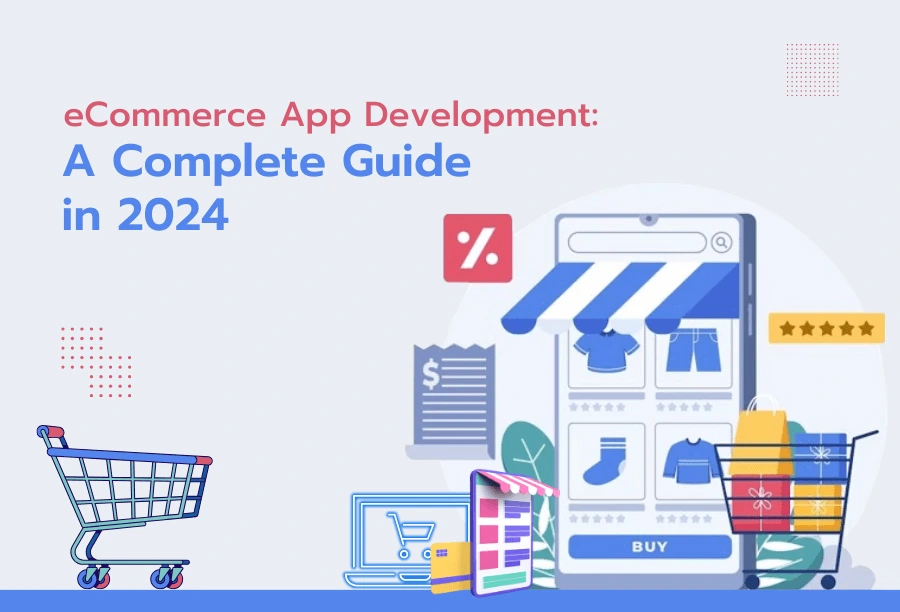
Estimated reading time: 8 minutes
Today, the 24-7 connectivity provided by mobile internet service providers serves as the primary touchpoint that seamlessly connects businesses and consumers. This has led to the rapid evolution of eCommerce into mobile commerce, or m-commerce. The widespread use of computers, mobile phones, tablets, and laptops has propelled this transformation, while the development of operating system-friendly applications has significantly increased the business value.
The market size of the eCommerce industry is projected to reach an astounding $16215.6 billion by 2027, highlighting its remarkable growth. A recent survey further indicates that the eCommerce industry is poised to attract approximately 230 million users in the near future.
As you ponder the best approach for developing a robust e-commerce app, this blog will guide you through the fundamental considerations essential for enhancing your e-commerce business and website with a dedicated app.
Related Links
Introduction To E-commerce App Development
In today’s digital age, consumers prioritize the convenience of shopping online from their homes or while on the move. E-commerce apps are pivotal in enabling businesses to engage with customers, display their products, and streamline transactions.
These applications empower users to explore diverse products, securely make purchases, monitor orders, and receive timely notifications. By delivering a personalized and convenient shopping experience, e-commerce apps foster customer loyalty and encourage repeat purchases.
Make sure you partner with the Best Mobile App Development Company in Dallas, TX, US like Mariox Software Pvt. Ltd., to turn your million-dollar ideas into functional applications.
Understanding The Benefits Of E-Commerce Apps
E-commerce apps provide businesses with a multitude of benefits, including heightened sales, enhanced customer engagement, amplified brand visibility, and strengthened customer loyalty.
With a dedicated app, businesses can access the expanding mobile user base and meet the needs of on-the-go shoppers. Key benefits of e-commerce apps encompass –
Enhanced User Experience – E-commerce apps deliver a seamless and intuitive interface, empowering users to effortlessly navigate through products and make online purchases with just a few taps.
Personalization and Customization – An e-commerce app enables businesses to provide personalized and customized recommendations based on user preferences and browsing history, thus creating a tailored shopping experience.
Improved Customer Engagement – Small and big businesses can engage with customers in real-time using push notifications and in-app messages, keeping them informed about new products, discounts, or special offers.
Increased Sales and Revenue – E-commerce apps act as a direct sales channel, cutting out the need for intermediaries. By delivering a seamless and convenient shopping experience, these apps hold the potential to increase sales and revenue substantially.
Brand Building – A meticulously crafted e-commerce app that embodies the brand’s identity, values, and aesthetics. It assists businesses in building a strong brand presence and fostering deeper connections with customers.
Key Features To Consider In E-Commerce Application Development
Developing an e-commerce app that users can access and operate from virtually anywhere at any time is a crucial asset for the efficient operation of any modern business. With retail predominantly occurring through mobile and online channels, an app can add immense value to the chain of events that govern startup and big business transactions.
When you create an e-commerce app, you need the best web development company. With the help of this app, it’s crucial to integrate critical features that enhance the user experience and drive conversions. Here are some important features to consider:
User Registration and Authentication
Enabling users to create accounts using their social media credentials. Implementing secure authentication methods to protect user data and privacy.
Product Catalog and Search
Crafting a comprehensive product catalog featuring clear product descriptions, high-quality images, and relevant categories. Implementing a robust search functionality to assist users in finding products quickly and easily.
Shopping Cart and Checkout
Empowering users to effortlessly add products to their shopping carts, review their orders, and seamlessly proceed to a secure checkout process. Offering several payment options to ensure a smooth and convenient transaction experience.
Payment Integration
Integrating popular payment gateways to facilitate secure and convenient transactions. E-commerce companies ensure PCI compliance and implement encryption to protect sensitive user data.
Order Tracking and Notifications
Offer users the capability to track their orders in real-time and receive notifications at each stage of the delivery process. Keep them informed about order status, shipment tracking, and estimated delivery dates.
Ratings and Reviews
Enable customers to leave ratings and reviews for products they’ve purchased. This action fosters trust and credibility among potential buyers.
Social Media Integration
Integrate social media sharing options to empower users to share their favorite goods or services with their friends and followers. Utilize social media networks to enhance brand visibility and stimulate user engagement.
Choosing The Right E-Commerce App Development Platform
When considering e-commerce app development, you have several options to choose from. The platform you select depends on factors such as budget, time constraints, desired features, and target audience. Here are three common options:

Native App Development
Developing native apps involves building separate apps for iOS and Android platforms using their respective programming languages. Native applications provide the best performance and user experience but demand more time and resources.
Hybrid App Development
Harnessing web technologies like HTML, CSS, and JavaScript, hybrid app development crafts a single app capable of running on multiple platforms. While hybrid apps offer faster development time and lower costs, they may not deliver the same level of performance as native apps.
Progressive Web Apps (PWAs)
Progressive Web Applications (PWAs) provide an app-like experience while being accessible through a browser. They are built using website technologies and can be installed on a user’s home screen. PWAs offer cross-platform compatibility and easier maintenance but may have limited access to a few device features. When choosing a development platform, it’s crucial to consider factors such as the desired app performance, target audience, development resources, and long-term scalability.
Types Of App Development For E-Commerce
The rise of smartphones for shopping has propelled mobile commerce (m-commerce) into a platform that consistently drives businesses forward. This success story has introduced a new dimension for businesses to generate revenue. Mobile applications have provided uninterrupted connectivity for customers, enabling them to access their favorite stores at any time to place orders.

Considering the diverse models existing within businesses, the applications supporting their operations also vary. Businesses tailor these applications to achieve specific goals and objectives, differentiating them based on their unique features and functionalities.
These are descriptions of different types of e-commerce apps, each developed to facilitate specific activities:
B2B (Business-To-Business) eCommerce App
These applications are capable of facilitating business deals over their interface. They enable the exchange of several goods and services via a mobile channel, catering to significant transactions involving large quantities.
Examples of such platforms include Alibaba, Amazon Business, and Quill, where industries sell to retailers who, in turn, sell to consumers. The products sold on these platforms can serve as raw materials or items for sale for other industries downstream.
B2C (Business-To-Consumer) eCommerce App
These applications supplement a B2C model, involving the company at one end and the end user of the product at the other. Sales occur directly through the application channel.
Examples of such e-commerce apps include Amazon and Dominos. They provide consumers with direct access to all the products offered by a company, eliminating the stock and variety limitations that retailers might face when dealing with multiple brands.
C2B (Consumer-to-Business) eCommerce App
Businesses also function as buyers for niche domain-specific offerings such as content, design, and technical assets. C2B applications like Clutch and GitHub serve as platforms for subject matter experts to showcase their talent and establish business relationships.
Through these platforms, businesses cultivate unique strengths through their purchases and advocate for the practice of sharing valuable expertise via such channels.
C2C (Consumer-to-Consumer) eCommerce App
When consumers exchange their products or services amongst themselves, without the involvement of any business or company, a C2C model operates through a mobile app.
Applications like OLX and eBay, which enable consumers to sell their products to others like themselves, promote such transactions, fostering connectivity within a broader user base, such as the community.
Other application types
Ticketing Booking eCommerce App – These e-commerce apps facilitate bookings for cabs, live shows, hotels, games, travel, professional or social events, and parties. Organizers use the application to share details of their activities, and interested individuals can purchase tickets or pass through the application interface.
eCommerce Aggregator App – Aggregator e-commerce apps bridge the gap between end customers and service providers such as Walmart Inc. and Etsy Inc. These apps provide a platform for service providers to list their offerings, items, or products, enabling buyers to purchase or avail of them directly through the application interface.
Conclusion
E-commerce businesses today are revolutionizing their customer-centric approach to seamlessly integrate into people’s everyday lives. By incorporating intelligent features to enhance responsiveness and engagement with buyers, they are significantly elevating the entire online shopping experience.
The growing consumer demands have driven a rapid surge in e-commerce app development. This desire for an in-store experience from the comfort of home has set new standards for developers. This trend has propelled innovation, creating seamless interfaces, personalized experiences, and immersive features. E-commerce apps are now at the forefront of redefining the shopping experience, blurring the lines between physical and digital retail.
Growing consumer demands fuel a rapid surge in e-commerce app development. This desire for an in-store experience from the comfort of the home sets new standards for developers. This trend propels innovation, creating seamless interfaces, personalized experiences, and immersive features. E-commerce apps lead the charge in redefining the shopping experience, blurring the lines between digital and physical retail.
Contact Matchbox Design Group Today!
If your website could use a refresh or you’re looking to drive more traffic to your site, fill out the form below and we’ll contact you to learn more about your digital needs.
Author Bio
I am Akshay Limbachiya, your SEO consultant who helps brands scale their organic traffic through content strategy and link building. I am assisting several brands in acquiring high-authority backlinks. Feel free to contact me on LinkedIn by clicking on this link Akshay Limbachiya.

